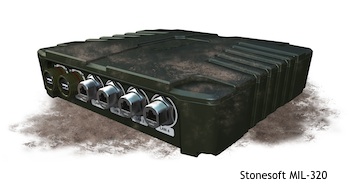Firewalls deployed in neatly-stacked racks protected by thick concrete walls within climate controlled datacenters have it nice. Not all firewalls are so lucky, and some have it rough—literally.
Network security vendor Stonesoft on Tuesday announced a new Next Generation Firewall designed for military deployments in harsh environments that provides military-grade network security in a rugged unit designed to go anywhere–even hostile environments where freezing temperatures, sand or moisture are likely to render most security appliances useless.
 According to the company, the new Stonesoft MIL-320 Next Generation Firewall utilizes the company’s “data stream-based normalization and deep inspection” across all protocols and network layers to detect and prevent cyber attacks, including those that come by way of attackers using Advanced Evasion Techniques.
According to the company, the new Stonesoft MIL-320 Next Generation Firewall utilizes the company’s “data stream-based normalization and deep inspection” across all protocols and network layers to detect and prevent cyber attacks, including those that come by way of attackers using Advanced Evasion Techniques.
The tough looking MIL-320 appliance packs advanced network security features into a tough and compact unit, certified for high-performance operations in extreme environments. The heavy-duty units are designed to be able to run in extreme temperatures, wet, mud and dust, and be resistant to frequent bumps and shocks.
With military technology often deployed outside controlled datacenters and other stable environments, the need to protect data and communications in extreme conditions is a frequent requirement.
“Armed forces have a particular, life-saving need for the rapid mass deployment of security appliances in hostile conditions,” the company said.
“Signals and network defense specialists in the modern military are required to facilitate distributed operations with robust, secure, high-performance networks that enable situational awareness, reliable communications, and even collaborative working and office tools in the field,” the company continued.
The MIL-320 offers protection against sophisticated attacks and includes a WLAN and ad-hoc mesh network support for resilient, strongly encrypted local communication links and data transfer between deployed units, the company said.
Additionally, the MIL-320 provides features like the capability for using custom encryption ciphers from a connected USB stick, and is straightforward to deploy in mechanized forces, infantry or in fixed installations.
While military deployments may be the first environments that come to mind when it comes to needing a durable security appliance, other industries that operate in extreme and rough environments can benefit from the MIL-320 as well.
“In storm force conditions on the dockside, at temporary border crossings, in law enforcement, remote depots, major events, underground rail links, on land and sea, intelligent network security is vital to protect the data flow, safety and wellbeing of businesses and societies,” the company said.
“You can drop [the MIL-320] from the helicopter or drive over it with a tank and you will stay secured,” said Antti Kuvaja, Director, Product Management at Stonesoft.
Pricing details are not yet available, but the Stonesoft MIL-320 is scheduled to be available for shipping in the beginning of 2013.
Helsinki, Finland-based Stonesoft also has a North American headquarters in Atlanta, Georgia.














